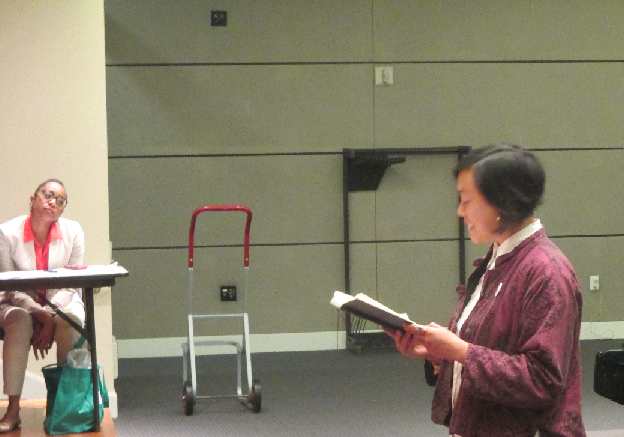The future of the Democratic Party in San Francisco came down entirely to timing.
As a move that would have given the mayor and his allies considerable additional power came before the Democratic County Central Committee tonight, the only issue was whether enough members of the progressive minority would get there on time.
The pro-real-estate folks who dominate the party right now were one vote short of the two-thirds they need to abruptly change the rules for DCCC membership in the middle of an election.

So the vote was going to be razor close. But you have to be present to vote – and unlike the Board of Supes, where an absence counts against a majority, the two-thirds is based on the number of people on hand for that meeting.
Carole Migden, former state Senator, was travelling and asked the chair, Mary Jung, if she could appoint a proxy. That’s standard practice – but the rules say that you can only be replaced by a proxy ten times in a term, and Migden has already used her ten. Jung, who had the discretion to allow a proxy vote anyway, refused.
So Migden raced back, making it just in time. Keith Baraka, who was the proxy for Sen. Mark Leno, an opponent of the change, was running late. Megan Levitan, who was one of the 11 critical votes against the bylaws change, wasn’t there when the meeting started either.
So the progressives were sweating, counting, and hoping … and as it turned out, there was more time than anyone expected.
That’s because Member Tom Hsieh Jr. (who supported the bylaws change) also put an item on the agenda at the last minute that would put the panel on record supporting plans for a new Piazza in North Beach that would involve closing down a block of Vallejo St.
Hsieh was the one who convinced former Sup. Angela Alioto to run for DCCC, and she’s the chief proponent of the piazza.
The item brought out as many speakers as you might expect for a Planning Commission meeting. Alioto came and spoke in favor. At least two dozen North Beach residents came to speak against it. The discussion went on for more than 45 minutes.
The merits of this idea are a matter for another day, but Hsieh did his foes a big favor: By the time the committee actually got to the important business, which was a profound change in the makeup of the panel, everyone was present.
And at that point, it was clear that Alix Rosenthal, who had sponsored the measure, didn’t have the votes to pass it.
So Rosenthal backed off, and proposed that the measure instead become a non-binding resolution, calling on the next DCCC to consider the changes she wanted. Hene Kelly asked to make the resolution even broader, and Rosenthan agreed: In the end, by an overwhelming majority, the DCCC agreed to call for unspecified changes in the membership of the committee, after the election – and to also consider campaign contribution limits.
The result was a defeat for the ruling majority on the panel, and keeps open the possibility that the June election will bring in a new majority that will seek to replace Mary Jung, a lobbyist for the Board of Realtors, as chair.
Along the way, the DCCC also voted overwhelmingly to endorse a November ballot measure that would allow 16- and 17-year-olds the right to vote in local San Francisco elections. Most of the members thought this was a great idea (which a party that needs new young voters really ought to agree on); Dan Bernal, who is the proxy for Rep. Nancy Pelosi, talked about how impressive the young people who are promoting the measure were.
And he was right – the young speakers were all articulate, together, and made a great case.
What’s strange is that the vote wasn’t unanimous.
Sup. Malia Cohen not only voted No, but made a short statement, saying that she opposed the measure for the same reason she supported raising the age for tobacco sales to 21: Young people couldn’t be trusted to make good decisions. That’s an astonishing statement.
Levitan also voted No – and Sup. Scott Wiener, through a proxy, abstained, as did the chair, Mary Jung, and Hsieh Jr.
Here’s the message: The current leadership of the local Democratic Party doesn’t think 16- and 17-year-olds should be able to vote in local elections. Too bad the youth of San Francisco can’t vote June 7 on the leadership of the Democratic Party.







